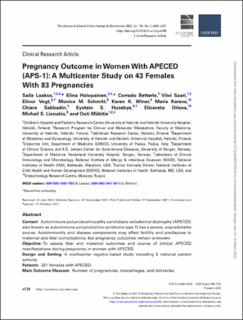Pregnancy Outcome in Women With APECED (APS-1): A Multicenter Study on 43 Females With 83 Pregnancies
Laakso, Saila; Hopolainen, Elina; Betterle, Corrado; Saari, Viivi; Vogt, Elinor Margrethe Chelsom; Schmitt, Monica M; Winer, Karen K.; Kareva, Maria A.; Sabbadin, Chiara; Husebye, Eystein Sverre; Orlova, Elizaveta; Lionakis, Michail; Makitie, Outi
Journal article, Peer reviewed
Published version

Åpne
Permanent lenke
https://hdl.handle.net/11250/2991633Utgivelsesdato
2022Metadata
Vis full innførselSamlinger
- Department of Clinical Science [2318]
- Registrations from Cristin [9791]
Originalversjon
Journal of Clinical Endocrinology and Metabolism (JCEM). 2022, 107 (2), e528–e537 10.1210/clinem/dgab705Sammendrag
Context
Autoimmune polyendocrinopathy-candidiasis-ectodermal dystrophy (APECED; also known as autoimmune polyendocrine syndrome type 1) has a severe, unpredictable course. Autoimmunity and disease components may affect fertility and predispose to maternal and fetal complications, but pregnancy outcomes remain unknown.
Objective
To assess fetal and maternal outcomes and course of clinical APECED manifestations during pregnancy in women with APECED.
Design and Setting
A multicenter registry-based study including 5 national patient cohorts.
Patients
321 females with APECED.
Main Outcome Measure
Number of pregnancies, miscarriages, and deliveries.
Results
Forty-three patients had altogether 83 pregnancies at median age of 27 years (range, 17–39). Sixty (72%) pregnancies led to a delivery, including 2 stillbirths (2.4%) and 5 (6.0%) preterm livebirths. Miscarriages, induced abortions, and ectopic pregnancies were observed in 14 (17%), 8 (10%), and 1 (1.2%) pregnancies, respectively. Ovum donation resulted in 5 (6.0%) pregnancies. High maternal age, premature ovarian insufficiency, primary adrenal insufficiency, or hypoparathyroidism did not associate with miscarriages. Women with livebirth had, on average, 4 APECED manifestations (range 0-10); 78% had hypoparathyroidism, and 36% had primary adrenal insufficiency. APECED manifestations remained mostly stable during pregnancy, but in 1 case, development of primary adrenal insufficiency led to adrenal crisis and stillbirth. Birth weights were normal in >80% and apart from 1 neonatal death of a preterm baby, no serious perinatal complications occurred.
Conclusions
Outcome of pregnancy in women with APECED was generally favorable. However, APECED warrants careful maternal multidisciplinary follow-up from preconceptual care until puerperium.
